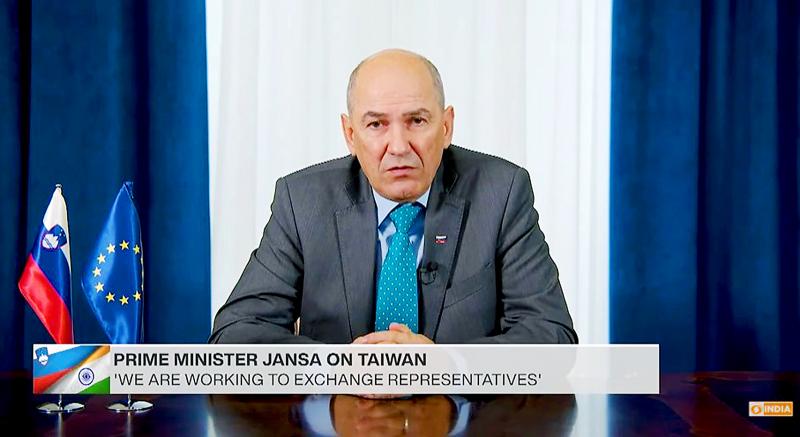The Ministry of Foreign Affairs yesterday welcomed Slovenia’s plan to establish a representative office in Taiwan, after Slovenian Prime Minister Janez Jansa revealed the plan in an interview with Indian TV station Doordarshan on Monday.
Taiwan is a democratic country that respects international democratic standards and international laws, the Slovenian prime minister said in the interview.
Slovenia and Taiwan are working on “exchanging representatives,” he said. “Of course, this will not be on the level of embassies. It will be on the same level as many of the EU member countries.”

Photo: screen grab from Doordarshan
“When I spoke with our businessmen who are trading with Taiwan, they told me that we are trading with Taiwan, but those companies from Taiwan are also trading with mainland China... They are doing this amongst themselves, but at the same time they’re opposing the same relations between Taiwan and other countries, which is ridiculous,” he said.
While the naming of the Taiwanese Representative Office in Lithuania has sparked some criticism in the EU nation, Jansa said that he did not consider it an issue.
“Lithuania is not an exception. There are some slight differences in naming the missions, but this is not important,” he said. “I think that any kind of proceeding pressure on Lithuania and some other countries in Europe will not benefit China’s government. Good trade relations are a common interest.”
After witnessing Taiwan’s disease prevention measures during the COVID-19 pandemic, Jansa said he personally called Minister of Health and Welfare Chen Shih-chung (陳時中) and they spoke via videoconference.
“Actually, we have normal relations with Taiwan,” he said.
Jansa said that he had visited Taiwan four or five times, and that he holds the view that Taiwanese should have the right to determine their future.
“If they want to join China, if it’s their free will without any pressure, without any military intervention and without any blackmailing, without strategic cheating as it is happening in Hong Kong currently, then we will support it. But if Taiwanese people want to live independently, we are here to support also this position,” he said.
“India is a crucial factor here to guarantee the balance of power and with this, the very foundation of possible peaceful solutions,” he added.
Jansa also backed Taiwan’s bid to join the WHO, saying: “I think it would also benefit China to have a neighboring country be a member of such an organization.”
Ministry spokeswoman Joanne Ou (歐江安) yesterday at a news conference in Taipei welcomed the Slovenian government’s plan to open a representative office, adding that the ministry appreciated Jansa’s “insightful” remarks.
“Prime Minister Jansa is a good friend of Taiwan and has visited the nation several times,” she said, thanking him for speaking the truth on international issues.
Taiwan and Slovenia have close economic and trade interactions, while their health ministers have shared their experiences with the pandemic via videoconference, she said.
The government would continue to deepen the nation’s relations with Slovenia and other democratic partners to develop mutually beneficial and resilient partnerships, Ou said.

AIR SUPPORT: The Ministry of National Defense thanked the US for the delivery, adding that it was an indicator of the White House’s commitment to the Taiwan Relations Act Deputy Minister of National Defense Po Horng-huei (柏鴻輝) and Representative to the US Alexander Yui on Friday attended a delivery ceremony for the first of Taiwan’s long-awaited 66 F-16C/D Block 70 jets at a Lockheed Martin Corp factory in Greenville, South Carolina. “We are so proud to be the global home of the F-16 and to support Taiwan’s air defense capabilities,” US Representative William Timmons wrote on X, alongside a photograph of Taiwanese and US officials at the event. The F-16C/D Block 70 jets Taiwan ordered have the same capabilities as aircraft that had been upgraded to F-16Vs. The batch of Lockheed Martin

US President Donald Trump yesterday announced sweeping "reciprocal tariffs" on US trading partners, including a 32 percent tax on goods from Taiwan that is set to take effect on Wednesday. At a Rose Garden event, Trump declared a 10 percent baseline tax on imports from all countries, with the White House saying it would take effect on Saturday. Countries with larger trade surpluses with the US would face higher duties beginning on Wednesday, including Taiwan (32 percent), China (34 percent), Japan (24 percent), South Korea (25 percent), Vietnam (46 percent) and Thailand (36 percent). Canada and Mexico, the two largest US trading

GRIDLOCK: The National Fire Agency’s Special Search and Rescue team is on standby to travel to the countries to help out with the rescue effort A powerful earthquake rocked Myanmar and neighboring Thailand yesterday, killing at least three people in Bangkok and burying dozens when a high-rise building under construction collapsed. Footage shared on social media from Myanmar’s second-largest city showed widespread destruction, raising fears that many were trapped under the rubble or killed. The magnitude 7.7 earthquake, with an epicenter near Mandalay in Myanmar, struck at midday and was followed by a strong magnitude 6.4 aftershock. The extent of death, injury and destruction — especially in Myanmar, which is embroiled in a civil war and where information is tightly controlled at the best of times —

China's military today said it began joint army, navy and rocket force exercises around Taiwan to "serve as a stern warning and powerful deterrent against Taiwanese independence," calling President William Lai (賴清德) a "parasite." The exercises come after Lai called Beijing a "foreign hostile force" last month. More than 10 Chinese military ships approached close to Taiwan's 24 nautical mile (44.4km) contiguous zone this morning and Taiwan sent its own warships to respond, two senior Taiwanese officials said. Taiwan has not yet detected any live fire by the Chinese military so far, one of the officials said. The drills took place after US Secretary